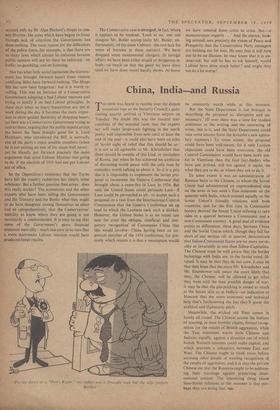China, India and Russia
TFIUNDER was heard to rumble over the distant mountain tops as the Security Council's ques- tioning quartet arrived at Vientiane airport on Tuesday. No doubt this was the natural con- comitant of the seasonal rains that the experts say will make large-scale fighting in the north pretty well impossible from now until at least the end of the year—it could also have been an echo of Soviet sighs of relief that this should be so: it is not at all agreeable to Mr. Khrushchev that there should be trouble of this kind, or reminders of Korea, just when he has achieved his ambition of discussing world peace with the only man he considers worth talking to about it. So it is a pity that it is impossible to implement the Soviet pro- posal to reconvene the Geneva Conference that brought about a cease-fire in Laos in 1954. But only the United States could persuade Laos—if Laos could be persuaded at all—to accept such a proposal, or a visit from the International Control Commission that the Geneva Conference set up (and to which the Laotians took such a dislike). However, the United States is in no mood just now for even the oblique, unofficial and tem- porary 'recognition' of CoMmunist China that this would involve—China having been an im- portant member of the 1954 conference, for pre- cisely which reason it is that a resumption would mc (fowl/ el% ll "0,01'1 IWIV, loftier was a Draught man but the wife prefers
Bolded.'
be eminently worth while at this moment. But the State Department is too brusque in describing the proposal as 'disruptive and un- necessary.' (If ever there was a time for studied politeness in the writing and the answering of notes, this is it, and the State Department could take some lessons from the Kremlin's new episto- lary manners.) To some extent, the proposal could have been well-meant, for if only Laotian objections could have been overcome, the old Control Commission would have been more use- ful in Vientiane than the four fact-finders who have just arrived, still not agreed, it seems. on what they are to do. or where they are to do it.
To some extent it was an administration of Russian balm to the Chinese, to whom the 'Soviet Union had administered an unprecedented slap on the wrist in last week's Tass statement on the quarrels with India, which insisted equally on the Soviet Union's friendly relations with both countries, and for the first time in Communist history showed the Soviet Union refusing to take sides in a quarrel between a Communist and a non-Communist country. A good deal of evidence points to differences, these days, between China and the Soviet Union which, though they fall far short of any serious rift or quarrel, demonstrate that fellow-Communist States are no more inevit- ably or invariably at one than fellow-Capitalists. The Chinese must be well aware that the border bickerings with India are. to the Soviet mind, ill- timed. It may be that they do not care; it may be that they hope that the more Mr. Khrushchev and Mr. Eisenhower talk peace the more likely that they, the Chinese, will be allowed to get what they want with the least possible danger of war; it may be that the pin-pricking is aimed as much at the Soviet skin as at India's—an indication to Moscow that the more economic and technical help that's forthcoming the less they'll queer the political and diplomatic pitch.
Meanwhile, the wicked old West comes in handy all round. The Chinese accuse the Indians of wanting, in their frontier claims, formal recog- nition for the results of British aggression, while the Tass statement warns both Chinese and Indians, equally, against a situation out of which hostile Western interests could make capital, and which prevents a relaxation between East and West. The Chinese ought to think twice before -accusing other people of wanting recognition of the results of aggression, and it is into the private Chinese ear that the Russians ought to be address- ing their warnings against preserving inter- national tension. The interesting thing about Sino-Soviet relations at the moment is that per- haps they are doing that. too.










































 Previous page
Previous page